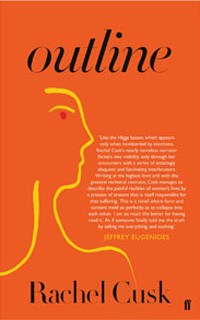Paused in an atmosphere of extraordinary pallor and thickness
 Outline
Outline
by Rachel Cusk
Though Cusk has written eight other books in-between, this new novel shares a lot in common with her first two books. There is a vagueness about it and a distinct lack of story, but there is also some beautiful writing.
The narrator is an English divorcee writer (a little autobiography peeking through perhaps?) who goes to Greece to teach a writing class for a week. That’s pretty much the whole story. She speaks with a series of people, some friends, some random strangers, and recounts their stories. She has a knack of getting people to open up to her but reveals very little about herself. And yet she does seem concerned with the truth and questions the honesty of those she speaks to.
The title appears to refer to the series of sketches of people’s lives that the narrator presents, but a quote from towards the end of the book suggests another reason:
“She began to see herself as a shape, an outline, with all the detail filled in around it while the shape itself remained blank. Yet this shape, even while its content remained unknown, gave her…a sense of who she now was.”
Though this quote is from another character, it very much describes the narrator as we see her in this novel: surrounded by detail while remaining almost a blank space herself. While this makes her a frustrating character, as there’s nothing to relate to or get absorbed in, I have seen it suggested that she is this way because she’s depressed, and that rang very true for me. The narrator seems empty and lacklustre, making decisions that seem surprising and risky without appearing to have actively made any decision.
Arguably this is a classic example of the literary novel with little or no plot, which only works if there is strong character or emotional complexity as well as great writing. I think there is complex emotion going on in this book without question, but it isn’t handed to you on a plate, it requires inference, and that can get frustrating and wearing. I can’t quite decide whether that means I would get more from reading it a second time, or if I would get even more annoyed with the narrator.
“At evening, with the sun no longer overhead, the air developed a kind of viscosity in which time seemed to stand very still and the labyrinth of the city, no longer bisected by light and shade and unstirred by the afternoon breezes, appeared suspended in a kind of dream, paused in an atmosphere of extraordinary pallor and thickness. At some point darkness fell, but otherwise the evenings were strangely without progression.”
I read this for the inaugural Bristol 24/7 Reads book group. Next month we’re reading How to be Both by Ali Smith. Do join our discussions on Google+ or Twitter.
Published 2014 by Faber & Faber.
Source: Copies were kindly supplied by the Baileys Women’s Prize for Fiction to my book group.